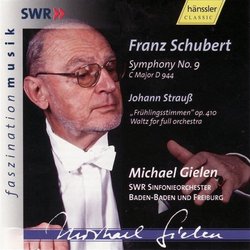| All Artists: Franz [Vienna] Schubert, Johann II [Junior] Strauss, Michael Gielen, SWR Baden-Baden and Freiburg Symphony Orchestra, SWF Sinfonieorchester Baden-Baden Title: Schubert: Symphony No. 9; Strauss: Fr�hlingsstimmen Members Wishing: 0 Total Copies: 0 Label: Hanssler Classics Original Release Date: 1/1/2005 Re-Release Date: 8/1/2004 Genre: Classical Styles: Historical Periods, Modern, 20th, & 21st Century, Symphonies Number of Discs: 1 SwapaCD Credits: 1 UPCs: 040888305729, 4010276013075 |
Search - Franz [Vienna] Schubert, Johann II [Junior] Strauss, Michael Gielen :: Schubert: Symphony No. 9; Strauss: Fr�hlingsstimmen
 | Franz [Vienna] Schubert, Johann II [Junior] Strauss, Michael Gielen Schubert: Symphony No. 9; Strauss: Fr�hlingsstimmen Genre: Classical
|
Larger Image |
CD Details |
CD ReviewsA truly sunny performance. Kimba W. Lion | the East Coast | 12/08/2008 (5 out of 5 stars) "I never have been able to figure out the "slower is more meaningful" school of thought. (If that's what you like, try Bohm: Schubert: Symphonies). One of the most-often-used words to describe this symphony is "sunny", yet most performances start out sounding positively mournful--their opening horn motif sounds like a lioness grieving for her dead cubs. Here, Gielen is upbeat and happy; I'm reminded of Mendelssohn's Italian symphony. And the... well, _sunny_ mood continues through a performance of power, majesty, hope and affirmation. Gielen even manages a Beethovenian heaven-storming quality in appropriate places. This is a performance I will return to often." Once over lightly for Schubert and J. Strauss -- why bother Santa Fe Listener | Santa Fe, NM USA | 10/28/2008 (3 out of 5 stars) "Is Michael Gielen an unsung genius camped out in the German hinterrland or a late, and rather tepid, holdover of the conducting style associated with Toscanini, Goerge Szell, and Erich Kleiber? They justified their "objective" approach, with its refusal to allow sentiment, rubato, or outdated Romanticism, by interpreting the score with absorbing intensity. In this Schubert Ninth Gielen is merely impatient -- much too fast in the opening Andante, where the main motto sounds like elfin horn calls across the glade, not the subject for a major symphony. With nowhere to go when the score reaches an Allegro, Gielen simply keeps the same fast tempo but brightens it up even more.
The remaining movements are equally superficial, passing by swiftly with no memorable events. I am resigned to the fact that some critics praise this kind of music-making (Fanfare magazine's reviewer cited "elegance" as the chief virtue of this CD -- why not have Noel Coward conduct it?), but it does great music a disservice to give it the once over lightly. The SWR SO of Baden-Baden don't exactly cover themselves in glory, but they are well drilled and can handle the scrambling string writing that opens the finale. The recorded sound is good. As a filler, which is where Gielen usually offers something unexpected, we stay comfortably in Vienna with Strauss's "Voices of Spring" waltz, nicely done even if Gielen goes oddly limp here and there." |

 Track Listings (5) - Disc #1
Track Listings (5) - Disc #1